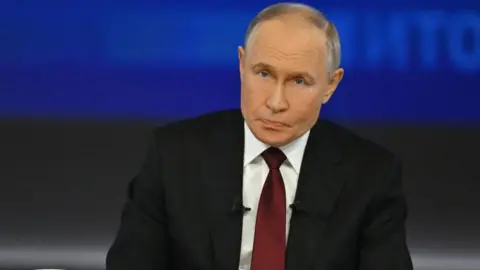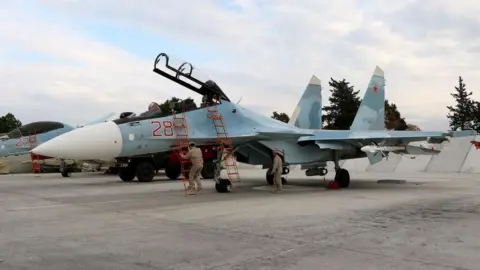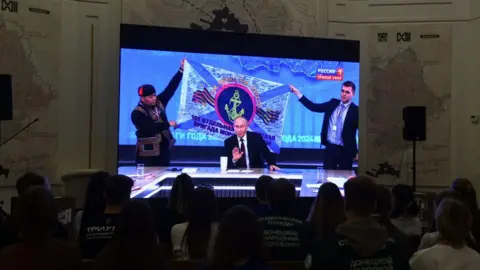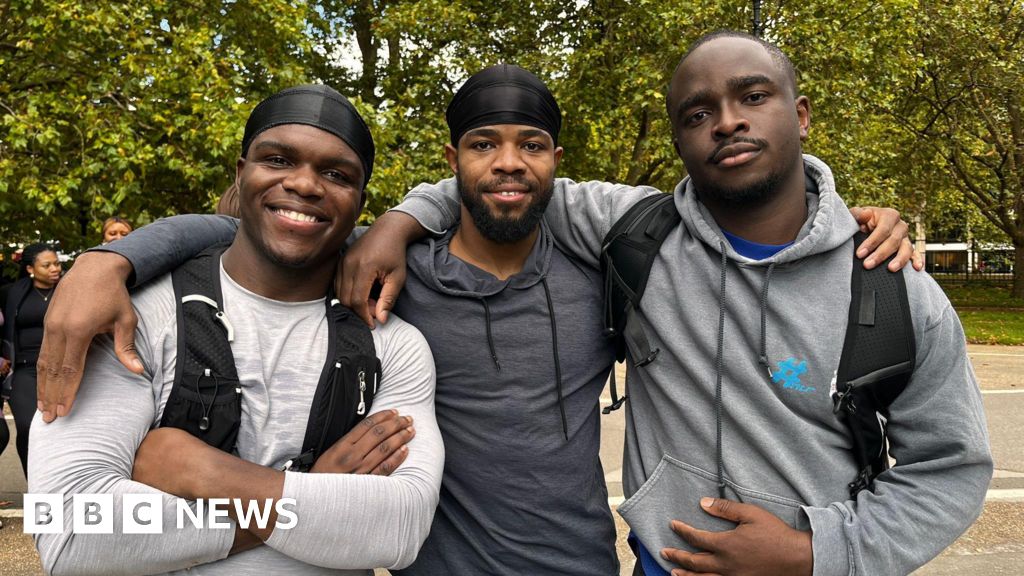ARTICLE AD BOX

 Getty Images
Getty Images
Russian President Vladimir Putin has said Russia should have launched a full-scale invasion of Ukraine earlier and been better prepared for the war.
In his end-of-year press conference on Thursday, Putin said with hindsight there should have been "systemic preparation" for the 2022 invasion, which he refers to as a "special military operation".
Russia seized Crimea from Ukraine in 2014 and pro-Russian forces began a conflict in eastern Ukraine, but it was eight years later that Putin tried to seize Kyiv.
During his four-hour long appearance, Putin also talked about Syria's deposed leader, Russia's more aggressive nuclear doctrine as well as domestic issues.
Billed as "Results of the Year with Vladimir Putin", the event was broadcast live across the main state TV channels on Thursday.
Putin appeared in front of a large blue screen emblazoned with a map of the Russian Federation, complete with annexed parts of Ukraine.
He took questions from members of the public, foreign journalists and pensioners - but it was a highly choreographed and tightly controlled affair.
When asked at the end by the BBC's Russia editor Steve Rosenberg whether he felt the country was in a better state than where his predecessor, Boris Yeltsin, had left it 25 years ago, Putin said Russia had regained its "sovereignty".
"With everything that was happening to Russia before that, we were heading towards a complete, total loss of our sovereignty."
Asked about the fall of the Assad regime in Syria, Putin insisted it was not a defeat for the Kremlin - which supported President Bashar al-Assad militarily for years - but he admitted the situation was "complicated".
He said he had not yet spoken to ousted Syrian leader, who fled to Moscow as rebel forces closed in on Damascus earlier this month, but planned to do so soon.
He added that Russia was in talks with Syria's new rulers to retain two strategically important military bases on the Mediterranean coast and that Moscow would consider using them for humanitarian purposes.

 Getty Images
Getty Images
Russia holds some airbases in Syria, including this one at Hmeimim military base in Latakia province
On US President-elect Donald Trump, Putin said the pair had not spoken in four years, but he was ready to meet him "if he wants it".
When put to him he was in a weak position compared to Trump, who is set to take office in January, Putin quoted American writer Mark Twain: "The rumours of my death are much exaggerated," prompting a smattering of laughs in the conference hall.
Moving on to China, Putin said Russia's relations with its eastern neighbour had reached an all-time high and the two countries were coordinating actions on the world stage.
"In the last decade, the level and quality of our [Russia-China] relations have reached a point that has never existed throughout our entire history, " he said.
A lengthy portion of the session was focused on the war in Ukraine, with Putin saying he was "open to compromises" to end the war - although it was unclear what such compromises could entail.
Russian forces are making progress on the frontlines "everyday", he said, describing his troops as "heroes".
At one point, he produced a signed flag he said was given to him by Russian marines who were "fighting for the motherland" in the Kursk region, and ushered two observers to hold it behind him for the cameras.

 Getty Images
Getty Images
Putin produced a flag he said was given to him by Russian marines fighting in Kursk
He also talked up Russia's construction projects in areas it has seized from Ukraine, claiming the standard of roads in the Ukrainian region of Luhansk had greatly improved since it was seized by Russia-backed forces in 2014.
When asked by an audience member if the West had "received the message" on Russia's change to its nuclear doctrine, which Putin pushed through in November, he said "you'll have to ask them."
The new nuclear doctrine allows Russia to conduct a nuclear strike on any country, if it is backed by a nuclear power.
That means if Ukraine were to launch a large attack on Russia with conventional missiles, drones or aircraft, that could meet the criteria for a nuclear response, as could an attack on Belarus or any critical threat to Russia's sovereignty.
Putin also emphasised the capabilities of Russia's new intermediate-range ballistic missile, Oreshnik, which was used in a strike on Ukraine in November.
In order to test its power, he suggested Russia should fire the Oreshnik towards Ukraine, and Ukrainian air defence - using US-supplied systems - should try to bring it down.
As for the name "Oreshnik"? "Honestly," Putin said with a smirk, "No idea. No clue."
A dominant theme throughout the event was "Russian sovereignty", with Putin claiming that less reliance on international partners - partly a result of Western sanctions - was one of the key achievements of his invasion of Ukraine.
He said the economy was "stable", pointing to higher growth than countries like Germany, but admitted inflation of 9.1% was "alarming".
In fact, the economy is overheating and highly reliant on military production - sometimes termed the "military industrial complex".
Throughout the address, Putin also answered questions on domestic issues - from telephone scammers to young people's struggles with getting a mortgage.

 1 day ago
2
1 day ago
2








 English (US) ·
English (US) ·